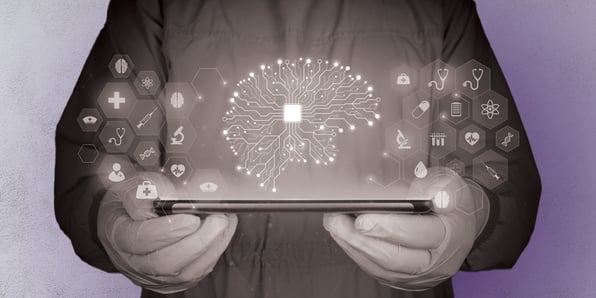Will AI replace medical coding?

As artificial intelligence (AI) becomes smarter, more companies in multiple industries are using AI-based tools in all facets of business. AI is being used for everything from customer service via chatbot to automating workflows. AI is expected to grow 37% each year from 2023 to 2030. Healthcare is one industry in which AI tools can automate processes and streamline workflows. But will AI replace medical coding? The answer is complex. AI has its advantages and disadvantages. Here is how AI could impact the industry as a whole.
Advantages of Using AI in Medical Billing
One of the biggest advantages of using AI for medical coding and billing is volume. Once an AI-powered tool has been properly trained, it can process more claims faster. AI easily combs through piles of data to generate reports and create invoices.
AI-powered medical billing platforms can also be trained to identify and fix coding and billing errors, helping agencies process claims faster with fewer denials. With AI, medical billers and coders can automatically verify insurance eligibility and benefits and flag patients whose information is missing or outdated.
Medical coding systems using AI rely on machine learning and natural language processing to generate algorithms that automate the coding process. Because they are not prone to human error, AI-powered systems are often more accurate.
Using AI-powered medical coding systems is also more cost-effective than hiring multiple coders or outsourcing this task to offshore companies. Your agency can train medical billers and coders to use the software and process more claims with fewer people.
Challenges of Using AI in Medical Billing
While AI can improve speed and accuracy, it’s far from perfect. Medical coders need extensive training and experience in the industry. They need to understand rules and regulations and various coding systems.
Through their knowledge and training, human coders can interpret complex medical issues that may require specific codes. For example, if a patient has complications related to a previous procedure or if they have comorbidities, coders may need to use different codes than they would for a patient being seen for a single issue.
AI also frequently shows biases. Because the people programming AI are influenced by their own experiences and perceptions, they may build bias into an AI-powered medical billing and coding program. A 2019 study of AI-powered medical systems showed that the algorithm didn’t recommend black patients for treatment unless they were sicker than white patients, because the algorithm was using historical information that reflected income disparities.
Finally, AI can put your agency at risk for violating data privacy regulations. Because AI systems are looking at large volumes of patient data, you need a way to protect all sensitive patient information from possible security breaches.
Will Medical Coding Be Replaced By AI?
Although AI has the power to process more claims accurately, it’s unlikely machines will completely replace human coders. It’s more likely that human coders will work together with AI to do their jobs more efficiently.
AI-powered systems can scour large volumes of patient records and caregiver notes to suggest relevant codes. Human coders can look through complicated cases to approve or deny these codes based on the notes.
Medical coders could be used to help program AI-powered tools by entering commands and historical data to train the software. Your coding team may also use AI to automate more tedious and repetitive parts of their jobs, which will free them up to tackle more complex tasks.
Healthcare is a nuanced industry, and many patients’ cases are complicated. While AI is great for handling simple cases, human coders are necessary for intricate cases. Because AI-powered tools are only as good as the data you enter, human oversight is also a must for your healthcare agency to minimize the risk of large-scale AI errors.
AI and the Future of Medical Coding
Another advantage of AI-powered coding systems is that many of them integrate with billing software. With these tools, you can shorten your revenue cycles and get paid more quickly. AI will eventually reduce the amount of manual data entry your medical billers and coders have to do.
AI also lets your medical coding team process health records and bills faster without impacting accuracy. Your team will have more time to evaluate complicated records, making it more difficult for patients to file fraudulent claims.
Final Thoughts: AI and Medical Coding
Unless AI tools evolve significantly over the next decade, they are not an adequate replacement for humans. However, AI can make the process better and more efficient, helping you shorten your revenue cycles. It also gives your team time to focus on complicated cases instead of spending their days on tedious, repetitive tasks.
Get Awesome Content Delivered Straight to Your Inbox!
Posts by topic
- RCM
- Medical Billing Software
- Outsource Your Medical Billing
- Compliance
- Physician Billing Services
- Denial Management
- AI
- Data Analytics
- EHR
- ERA
- reporting
- Automation
- Business
- Claim Scrubbing
- Coding
- Community
- Events
- LTPAC
- Medical Billing Companies
- Medicare
- Press Release
- Revenue Cycle Management
- business development
- clearinghouse See All See Less





